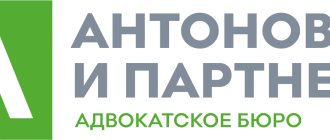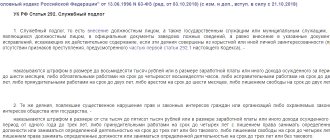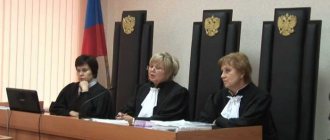1. Concealment or distortion of information about events, facts or phenomena that create a danger to the life or health of people or to the environment, committed by a person obliged to provide the population and bodies authorized to take measures to eliminate such danger with the specified information -
shall be punishable by a fine in the amount of up to three hundred thousand rubles or in the amount of the wages or other income of the convicted person for a period of up to two years, or by forced labor for a period of up to two years with or without deprivation of the right to hold certain positions or engage in certain activities for a period of up to three years, or imprisonment for a term of up to two years with or without deprivation of the right to hold certain positions or engage in certain activities for a term of up to three years.
2. The same acts, if they were committed by a person holding a public office of the Russian Federation or a public office of a constituent entity of the Russian Federation, as well as the head of a local government body, or if as a result of such acts harm was caused to human health or other grave consequences occurred, -
shall be punishable by a fine in the amount of one hundred thousand to five hundred thousand rubles, or in the amount of the wages or other income of the convicted person for a period of one to three years, or by forced labor for a term of up to five years, with deprivation of the right to hold certain positions or engage in certain activities for a term of up to three years or without it, or imprisonment for a term of up to five years with deprivation of the right to hold certain positions or engage in certain activities for a term of up to three years or without it.
Commentary to Art. 237 of the Criminal Code of the Russian Federation
1. The social danger of this crime lies in the fact that concealing from citizens information about events, facts or phenomena that pose a threat to the life and health of people does not allow the population to take appropriate measures to preserve their health and life.
2. The direct object of this crime is social relations that ensure public health.
3. Additional object - relations related to the right of citizens to receive complete and reliable information about the state of the environment.
4. An optional object is the life, health of a particular person or property relations, etc.
5. The subject of the crime is information about events, facts or phenomena that pose a danger to the life and health of people or the environment.
6. Information - information about persons, objects, facts and events, phenomena and processes, regardless of the form of their presentation. Documented documentation means information recorded on a tangible medium with details that allow it to be identified.
7. A fact is the result of what happened, what happened. For example, a large release of toxic substances into the atmosphere or water supply system.
8. Event - a manifestation associated with social life. For example, the occurrence of an emergency, accident, crash, or explosion, resulting in a violation of the environmental situation in a certain territory.
9. Phenomenon - an emergency situation of natural origin that threatens public health or the environment, e.g. earthquake, tsunami, hurricane, avalanche, mudflow.
10. Environment - the totality of components of the natural environment, natural and natural-anthropogenic objects (Article 1 of the Law on Environmental Protection).
11. The objective side of the crime is expressed: 1) in concealing information (through action and inaction); 2) in distorting information (through action).
12. Concealment means withholding relevant information by any means, including by omission or untimely reporting, as well as by refusing to provide information upon requests from the public, as well as authorities authorized to take measures to eliminate the impending danger.
13. Distortion of information - provision of biased, unreliable, falsified information, reporting of incomplete or unreliable data, official forecasts, estimates, etc.
A prerequisite for concealing or distorting information is creating a danger to the life or health of people or to the environment.
14. The crime provided for in Part 1 of the article has a formal element and is considered completed from the moment the actions that form the objective side of the crime are performed, regardless of whether the addressees received objective information from other sources and whether the threatening danger was eliminated.
15. The subjective side of the crime provided for in Part 1 of the commented article is characterized by guilt in the form of direct intent. The perpetrator is aware that he is distorting or hiding information and wants to do so.
16. The subjective side of the crime provided for in Part 2 of the article is characterized by guilt in the form of direct intent in relation to the act and in the form of negligence in relation to the resulting consequences.
17. The motive and purpose of concealing or distorting information about events, facts and phenomena that pose a danger to the life or health of people or the environment do not affect the qualification of the act.
There is no corpus delicti in the case of concealment or distortion of information that, in accordance with the Law of the Russian Federation of July 21, 1993 N 5485-1 “On State Secrets,” could not be communicated to certain persons.
18. The subject of the crime is special. This may be an individual who is obliged to provide the population and bodies authorized to take measures to eliminate the danger with relevant information. Such an obligation is assigned to them by law or other regulatory legal act or instruction. For example, such persons may be officials of state authorities, local government bodies, employees of special units (owners of information systems, employees and heads of local government bodies, forecast bureaus, sanitary and epidemiological stations, the Ministry of Emergency Situations of Russia, the Ministry of Internal Affairs of Russia).
19. The qualifying feature of Part 2 of the commented article is the commission of the specified crime by a person holding a public position in the Russian Federation or a constituent entity of the Russian Federation, as well as the head of a local government body (see commentary to Article 285).
20. Part 2 of the article provides for the infliction of harm to human health or the occurrence of other grave consequences as a result of such acts as an independent qualifying feature.
21. Causing harm to human health as a result of a crime means harm to health of any severity, including grave harm. Therefore, additional qualifications of the actions of the perpetrator in addition to Part 2 of Art. 237 also under Art. 118 of the Criminal Code is not required.
22. The occurrence of other grave consequences includes the death of people, a significant violation of environmental safety, causing major property damage, disruption of the normal operation of enterprises, institutions, organizations, etc.
Commentary on Article 237 of the Criminal Code of the Russian Federation
1. The social danger of this crime lies in the fact that concealing from citizens information about events, facts or phenomena that pose a threat to the life and health of people does not allow the population to take appropriate measures to preserve their health and life.
The crimes provided for in Part 1 of the commented article belong to the category of crimes of minor gravity; crimes provided for in Part 2 are classified as crimes of medium gravity.
2. The direct object of this crime is social relations that ensure public health. An additional object is relations related to the right of citizens to receive complete and reliable information about the state of the environment. The optional object is the life, health of a particular person or property relations, etc.
3. The subject of the crime is information about events, facts or phenomena that pose a danger to the life and health of people or the environment.
Information - information about persons, objects, facts and events, phenomena and processes, regardless of the form of their presentation. Documented documentation means information recorded on a tangible medium with details that allow it to be identified.
A fact is the result of something that has happened. For example, a large release of toxic substances into the atmosphere or water supply system.
An event is a manifestation associated with social life. For example, the occurrence of an emergency, accident, crash, or explosion, resulting in a violation of the environmental situation in a certain territory.
A phenomenon is an emergency of natural origin that threatens public health or the environment, for example: earthquake, tsunami, hurricane, avalanche, mudflow.
Environment - the totality of components of the natural environment, natural and natural-anthropogenic objects (Article 1 of the Law on Environmental Protection).
The objective side of the crime is expressed: 1) in concealing information (through action and inaction); 2) in distorting information (through action).
Concealment means withholding relevant information by any means, including by omission or untimely reporting, as well as by refusing to provide information upon requests from the public, as well as authorities authorized to take measures to eliminate the impending danger.
Distortion of information - provision of biased, unreliable, falsified information, reporting of incomplete or unreliable data, official forecasts, estimates, etc.
4. A prerequisite for concealing or distorting information is creating a danger to the life or health of people or to the environment.
5. The crime provided for in Part 1 of the commented article has a formal element and is considered completed from the moment the actions that form the objective side of the crime are performed, regardless of whether the addressees received objective information from other sources and whether the threatening danger was eliminated.
6. The subjective side of the crime provided for in Part 1 of the commented article is characterized by guilt in the form of direct intent. The perpetrator is aware that he is distorting or hiding information and wants to do so.
The subjective side of the crime provided for in Part 2 of the commented article is characterized by guilt in the form of direct intent in relation to the act and in the form of negligence in relation to the resulting consequences.
7. The motive and purpose of concealing or distorting information about events, facts and phenomena that pose a danger to the life or health of people or to the environment do not affect the qualification of the offense.
There is no corpus delicti of this crime in the case of concealment or distortion of information that, in accordance with the Law of the Russian Federation of July 21, 1993 N 5485-1 “On State Secrets” (as amended on November 8, 2011) <1> could not be communicated to certain persons .
——————————— <1> RG. 1993. 21 Sep; NW RF. 1996. N 15. Art. 1768; 1997. N 41. Art. 4673; 2002. N 52 (part 2). Art. 5288; 2003. N 6. Art. 549; N 27 (part 1). Art. 2700; N 46 (part 2). Art. 4449; 2004. N 27. Art. 2711; N 35. Art. 3607; 2007. N 49. Art. 6055, 6079; 2009. N 29. Art. 3617; 2010. N 47. Art. 6033; RG. 2011. N 159, 160, 254.
8. The subject of the crime is special. This may be an individual who is obliged to provide the population and bodies authorized to take measures to eliminate the danger with relevant information. Such an obligation is assigned to them by law or other regulatory legal act or instruction. For example, such persons may be officials of state authorities, local government bodies, employees of special units (owners of information systems, employees and heads of local government bodies, forecast bureaus, sanitary and epidemiological stations, the Ministry of Emergency Situations of Russia, the Ministry of Internal Affairs of Russia).
9. The qualifying feature of Part 2 of the commented article is the commission of the specified crime by a person holding a public position in the Russian Federation or a subject of the Russian Federation, as well as the head of a local government body (see commentary to Article 285).
Part 2 of the commented article provides for the infliction of harm to human health or the occurrence of other grave consequences as a result of such acts as an independent qualifying feature.
Causing harm to human health as a result of a crime means harm to health of any severity, including grave harm. Therefore, additional qualification of the actions of the perpetrator, in addition to Part 2 of the commented article, also under Art. 118 of the Criminal Code is not required.
The occurrence of other grave consequences includes the loss of life, a significant violation of environmental safety, causing major property damage, disruption of the normal operation of enterprises, institutions, organizations, etc.
Judicial practice: sentences and punishment under Art. 237 of the Criminal Code of the Russian Federation
- Resolution of the Plenum of the Supreme Court of the Russian Federation dated... PLENARY OF THE SUPREME COURT OF THE RUSSIAN FEDERATION DECISION dated December 27, 2002 N 29 ON JUDICIAL PRACTICE IN CASES OF THEFT,...
- Decision of the Supreme Court: Determination N 203-APU17-21... THE SUPREME COURT OF THE RUSSIAN FEDERATION Case No. 203-APU17-21 APPEAL DECISION Moscow August 31, 2022 Judicial Collegium for Military Personnel of the Supreme...
- Resolution of the Plenum of the Supreme Court of the Russian Federation dated... PLENARY OF THE SUPREME COURT OF THE RUSSIAN FEDERATION DECISION of November 15, 2016 N 48 ON THE PRACTICE OF APPLICATION BY COURTS OF LEGISLATION GOVERNING FEATURES...
- Resolution of the Plenum of the Supreme Court of the Russian Federation dated... PLENAUM OF THE SUPREME COURT OF THE RUSSIAN FEDERATION DECISION dated June 25, 2022 N 18 ON JUDICIAL PRACTICE IN CASES OF CRIMES,...
- Resolution of the Presidium of the Supreme Court of the Russian Federation dated... PRESIDIUM OF THE SUPREME COURT OF THE RUSSIAN FEDERATION DECISION dated December 5, 2018 N 126-P18 ON RESUMING PROCEEDINGS IN THE CASE DUE TO NEW...
- Ruling of the ECtHR dated 02/14/2017 EUROPEAN COURT OF HUMAN RIGHTS THIRD SECTION CASE “MASLOVA VS. RUSSIAN FEDERATION” (Complaint No. 15980/12) JUDGMENT…
- Resolution of the Plenum of the Supreme Court of the Russian Federation dated... PLENAUM OF THE SUPREME COURT OF THE RUSSIAN FEDERATION DECISION dated December 17, 2022 N 43 ON SOME ISSUES OF JUDICIAL PRACTICE IN CASES...
- Judicial Collegium for Criminal Cases, appeal:... THE SUPREME COURT OF THE RUSSIAN FEDERATION Case No. 72-APU 17-21 APPEAL DECISION Moscow October 04, 2022 Judicial Collegium for Criminal Cases...
- Decision of the Supreme Court: Resolution No. 310P13 dated... DECISION OF THE PRESIDIUM OF THE SUPREME COURT OF THE RUSSIAN FEDERATION Case No. 310-P13 Moscow January 23, 2014 Presidium of the Supreme Court of the Russian Federation...
- Decision of the Supreme Court: Determination No. 56-КГ16-46 dated... THE SUPREME COURT OF THE RUSSIAN FEDERATION No. 56-КГ16-46 DETERMINATION Moscow March 6, 2017 Judicial Collegium for Civil Cases of the Supreme Court...
Another comment on Art. 237 of the Criminal Code of the Russian Federation
1. The subject of the crime is information about events, facts or phenomena that pose a danger to the life or health of people or the environment (for example, about emergencies and disasters, their consequences, about natural disasters, their official forecasts and consequences, about the natural environment ).
Information about circumstances that pose a danger to the life or health of people, as well as the environment, cannot be classified as restricted information (state secrets and confidential information).
2. The objective side includes two alternative acts. Hiding information means taking actions aimed at concealing it. Distortion is the falsification of information specified in the law.
3. Special subject - a person obliged to provide the population and bodies authorized to take measures to eliminate danger to the life and health of people or the environment with relevant information.







